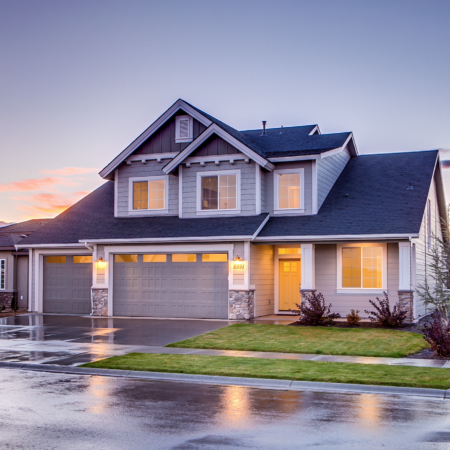
Few things in life are as stressful as buying a house, especially if you’re navigating the process for the first time. There’s a lot of confusion around the specifics—How much do you need to pay for a down payment? What’s a good mortgage?—and all of this is heightened by the amount of money you’re going to be spending. Chances are, your home will be the biggest purchase you ever make.
We don’t blame you for wanting to take your time and do this right. In fact, we want to help. In this guide, we’ll walk you through the steps you can take that will put you in the most advantageous position for purchasing a home.
Common Myths About Buying a Home
To start off, let’s debunk some common misconceptions about mortgages and purchasing a home.
1. You Don’t Always Need to Put 20% Down
Most people think all lenders require a 20% down payment—they don’t. In fact, according to the National Association of Realtors, the average down payment for first-time buyers in 2019 was 6% (overall it was 12%).
While this might sound like good news, making a down payment of less than 20% comes with a catch—you may be required to get Private Mortgage Insurance or have worse mortgage rates. It might be worth the tradeoff, though, if it allows you to purchase a house a few years earlier than you thought possible.
That being said, average down payments will vary depending on where you live. It’s possible that if you live in a more competitive housing market, the average down payment will be higher.
2. Lenders Will Offer Different Loans
It’s highly encouraged that before you start seriously shopping for a home, you investigate what kind of loan you could qualify for. Not all lenders will offer you the same type of loan and it’s best that you ask around and meet with different lenders to see what your financial options are. The Consumer Financial Protection Bureau recommends that you consult at least three different lenders before determining which loan is right for you.

3. Buying a House is Always Better than Renting
“If you don’t own a home, you’re just losing money on rent.” This is true sometimes, but not always. Whether or not buying a house is a smarter financial move than renting depends on a few different factors.
- Are You Planning to Settle Down? If you’re planning to stay in the same location for longer than five years, buying a house makes the most sense. If you’re planning on moving frequently, the flexibility of a lease is a much easier option. It can be difficult to sell a home less than five years after purchasing and break even.
- Does Owning a Home Cost As Much As Renting? In this instance, the answer is obviously in favor of owning a home, and taking the opportunity to build equity over time. If renting costs significantly less than owning a home in your particular market, think about renting cheaply and saving or investing your extra funds for a larger down payment in the future. Unlike the equity you’re building, this money is liquid.
- Can You Really Afford a Home? If you can’t afford a home in your market, or if you can only find homes that are beyond your budget, it may be better to wait. David Weliver of Money Under 30 writes: “…if you buy too much house and find you can’t afford your mortgage, you may not have any options. In the worst case, you could find yourself underwater in a bad housing market and not even be able to sell your house.”
Ready to Buy a Home? Here’s How to Prepare.
It’s likely you already have a few homes saved in your Zillow favorites or you’ve been eyeing that one gorgeous house down the street. But before you start seriously shopping, there are a few ways you can prepare for your huge financial commitment.
Get Preapproved for a Loan
We recommend that before you start a serious search, you get preapproved for a home loan. A preapproved loan will show sellers that you’re a serious buyer and will help you compete with other cash buyers.
Additionally, a preapproved loan will help you get a realistic idea of what your budget actually is.
Work with a Real Estate Agent
Websites like Zillow and Open Door that allow buyers to purchase a home directly are popular resources, but you may want to try working with a real estate agent. Sure, it costs a little more upfront, but an experienced real estate agent will help you navigate the purchasing process and save money in the long run. “Real estate agents come in both buyer’s and seller’s versions,” NPR reported, “When you buy a home, a buyer’s agent will represent your interests.”
Find Out if You Qualify for Assistance Programs or Grants
Especially if you’re a first-time buyer, you may be able to find assistance from local programs or grants. Some states offer resources to help prospective home buyers purchase homes.
Make Sure Your Credit Score is in a Great Place
Your credit score is going to play a major role in determining the kind of loan you qualify for. Additionally, applying for a loan will mean a hard inquiry on your credit—which means that you want to be approved for a loan right away to prevent too many hard inquiries from lowering your credit score even further.
If you have questionable negative items on your credit history, you may want to consider working with a reputable credit repair agency (like us!) to improve your credit score.
Save Up for Your Down Payment
Many prospective buyers cite the initial down payment as their primary blocker to buying a house. While you may not have to pay the traditional 20%, the down payment is going to be an enormous expense. Save now to pay as much upfront as you can.

Find a Job You Want to Stay at For the Next Few Years
Lenders want to see that you have a steady income and will be able to make payments on your loan. Typically, lenders look to see if you’ve held the same job for the last 2 – 3 years.
Don’t be Tempted Beyond Your Budget
Like we mentioned earlier, one of the last things you want is to be stuck with a house you can barely afford. And yet, it’s not uncommon for buyers to purchase a home outside of their budget. According to Zillow’s Consumer Housing Trends Report of 2019, 26% of buyers reported purchasing a home beyond their budget. When asked why, 33% said that they had fallen in love with a particular house.
Take Your Time
On average, it takes about 4.5 months to purchase a house. This is a huge financial decision that may impact the rest of your life and shouldn’t be rushed into. That being said, emotions play a major role in purchasing a home. It can be hard to pass on a dream house outside of your budget, or not be motivated by competition with other buyers. We recommend that you take your time to find a house that aligns with your wish list and budget.
Is 2020 the Year You Buy a Home?
If 2020 isn’t the year you buy a home, it can be the year that you begin to prepare. You can start right now by improving your credit score, saving for a down payment, educating yourself about the particulars of your housing market or attaining a stable income.
Like we said above, although a house can be a great investment, it’s also likely to be the biggest purchase of your life. Don’t be afraid to take your time.






